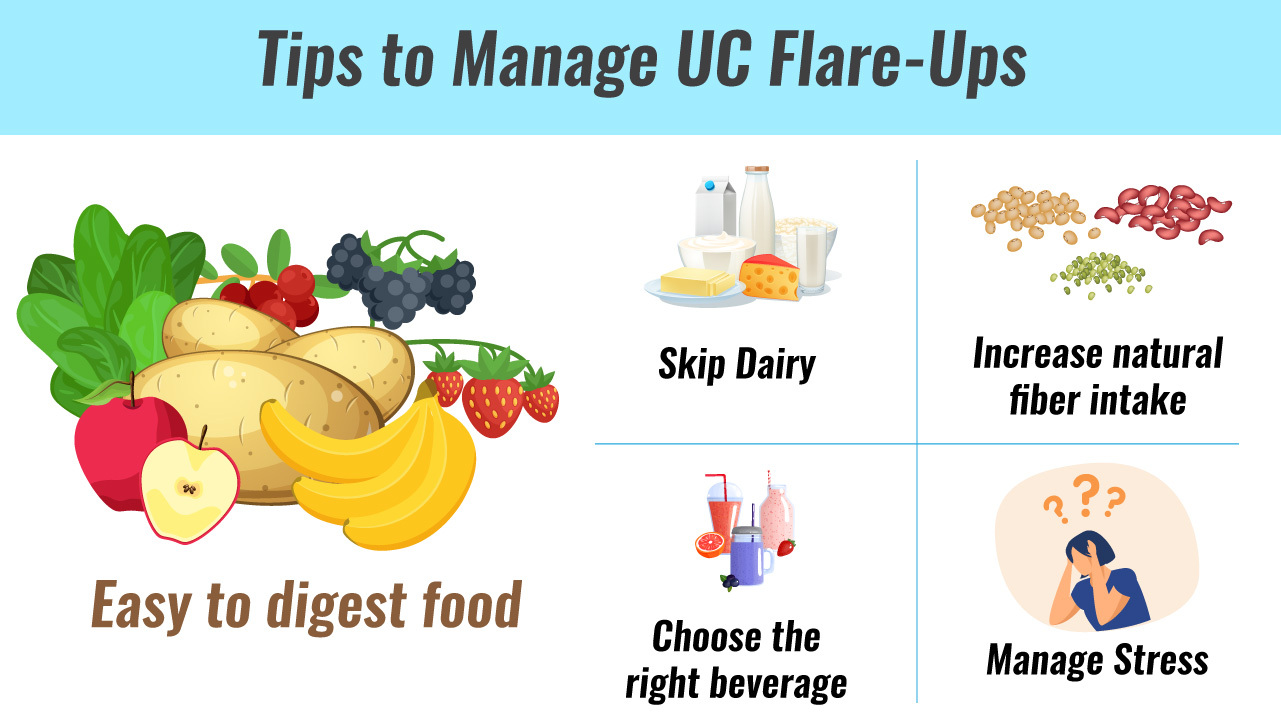
Ulcerative Colitis- A quick overview
It is an inflammatory bowel disease that causes inflammation and sores on the lining of the large intestine and the rectum.
What is Flare-up?
People with ulcerative colitis experience a period of active symptoms which is known as flares or flare-ups. The most important part of living with UC is managing and easing the symptoms of the flare-up and reducing their duration. Flare-up is generally followed by the remission period, where the symptoms don’t hamper day-to-day life.
What Can Affect Ulcerative Colitis Flare-ups?
The concrete reasons causing the UC flare-up are still unknown. For some people, the effects might be visible in only a small section, but for a few, it might spread through the entire colon. However, certain factors that might trigger the flare-ups are:
- Smoking– Cigarettes are not only one of the major factors that cause UC, but also can cause flare-ups.
- Food that irritates the GI tract– There is evidence that food can cause UC or flare. Consuming certain foods during a flare-up can aggravate the symptoms.
- Unnecessary Medication– Flare-up can be a result of intake of unprescribed over-the-counter drugs. Nonsteroidal anti-inflammatory drugs like Aspirin, Naproxen, Ibuprofen, and others can worsen the flare-up symptoms.
- Stress– Emotional or physical stress doesn’t cause ulcerative colitis directly, but it does affect the digestive process and hence contributes to the worsening of flare-ups.
Warning Signs of Ulcerative Colitis Flare Up
Flares come up suddenly and are acute very often. For some, it lasts from days to weeks. Between the flare-ups, one may experience a remission period which can also last from days to weeks.
Symptoms of flare differ depending upon the severity and the location of the inflammation. The most common flare-up symptoms include:
- Abdominal pain or cramp
- Urgent frequent bowel movement
- Diarrhea
- Blood discharge in stools
- Unintentional weight loss
- Fever and Nausea
- Loss of appetite

Tips to Manage Ulcerative Colitis Flare-ups
Ulcerative Colitis flare-up is the return of symptoms after the remission period. It involves diarrhea, abdominal pain, cramps, rectal pain, bleeding, fatigue, and urgent bowel movement. Although one might feel helpless against the flare-up, a few changes in the diet and lifestyle can help in controlling the symptoms and ease the flare-up pain.
- Skip Dairy:
There is more and more emerging evidence that food plays a big role in ulcerative colitis. Dairy products are one of the possible culprits. Avoiding dairy can aid in reducing diarrhea, symptoms of abdominal pain, and gas.
- Increase natural fiber intake:
Fiber-rich food is a must for a balanced diet. In fact, fiber-rich foods help bowel movement and add bulk to the stool, making it easier to pass. Try to add healthy sources of fiber to your food such as cooked leafy vegetables and fruits. It is, however, advisable to avoid nuts, seeds, and corn too.
- Choose the right beverage
Make sure you’re consuming enough liquid to avoid dehydration. Avoid alcoholic beverages as they can stimulate the intestines and worsen diarrhea. Also avoid caffeine, soda, etc. Carbonated drinks can bring in trouble as they can produce gas.
- Manage Stress:
Stress doesn’t directly cause ulcerative colitis but it has been linked to stomach issues. It can worsen the symptoms and trigger a flare-up. Exercise and meditation can help in reducing the tension and keep the bowel functioning well.
- Easy to digest food
A flare can zap the appetite, but it is important to nourish the body with healthy whole plant foods. Skip fatty and greasy food and increase the intake of fruits and cooked veggies. Bland items work the best for most people.
Final Words
At High Carb Health, we believe that through incorporating healthy living practices one can keep their bodies clean from within and also free from energy-robbing toxic matters. Through this, one can ensure a healthier life, free from disease. High Carb suggests consulting your dietician or nutritionist to get your specific whole foods plant based meal plan.
Lifestyle changes we recommend to manage an Ulcerative Colitis Flare Up:
- Get 8 to 10 hours of sleep
- Exercise
- Decrease Stress
- Reduce intake of oily & spicy food
- Limit Dairy intake
- Avoid alcohol
- Avoid eating animal products
FAQ
- How long does ulcerative colitis flare last?
A flare-up might take days or weeks. One may go from a mild flare-up to a severe one and back again. Or, it may get more advanced and spread to other parts of the colon.
- Can ulcerative colitis flare up go away on its own?
Flare-up is a progressive condition and doesn’t get any better on its own, unless certain lifestyle changes are made. The symptoms might get worse and cause the inflammation to spread within the colon.
- What does a UC flare feel like?
A flare-up is the return of symptoms after a period of remission, which involves diarrhea, abdominal pain, cramping, rectal pain and bleeding, fatigue, and urgent bowel movements.
